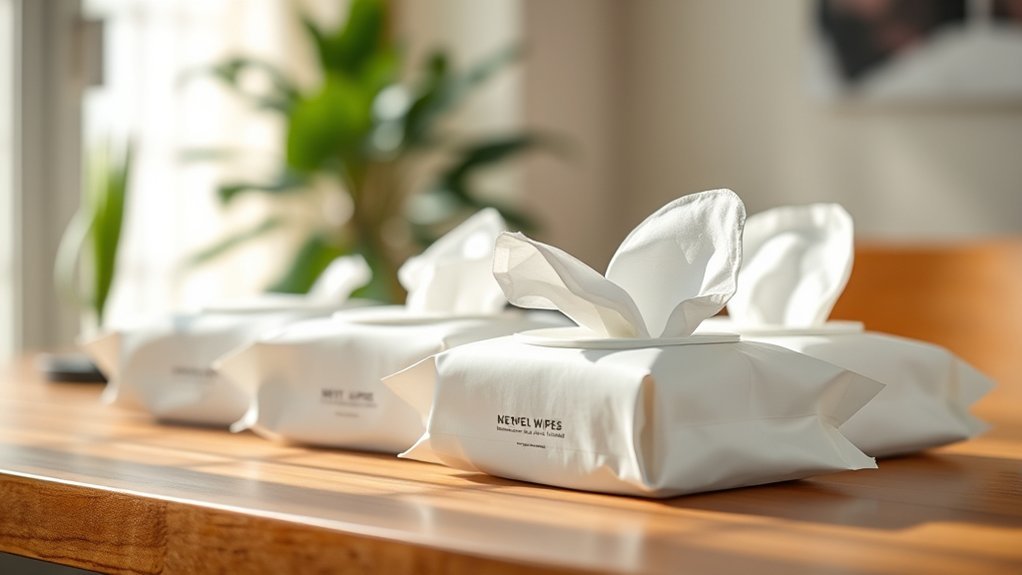Did you know that not all wipes are created equal? Many people overlook the specific features that can greatly impact their effectiveness and safety. Whether you’re tackling everyday messes or looking for something specialized, understanding what to take into account is essential. In this guide, you’ll discover how to choose the best wipes for your needs, ensuring both cleanliness and sustainability. What factors should you prioritize as you make your selection?
Understanding Different Types of Wipes
When considering wipes, how do you choose the right type for your needs? You’ll find that the variety of wipes available caters to different preferences and purposes.
Biodegradable options are gaining popularity among eco-conscious consumers, as they break down more easily in the environment. These wipes offer a sustainable choice without compromising on effectiveness.
Biodegradable wipes are an eco-friendly choice, breaking down easily while maintaining their cleaning effectiveness.
On the other hand, scented varieties can enhance your cleaning experience, providing a rejuvenating aroma that can uplift your mood. However, you should be mindful of potential allergens in fragrances.
Evaluating your specific requirements—whether it’s environmental impact or sensory experience—will guide you in selecting the right wipes that align with your values and lifestyle.
Key Features to Consider
As you evaluate your options, several key features can greatly influence your choice of wipes. Understanding these elements will empower you to make informed decisions that suit your needs.
- Material Types: Consider the fabric composition. Some wipes are made from biodegradable materials, while others use synthetic fibers. Your choice impacts both effectiveness and environmental footprint.
- Packaging Options: Think about how the wipes are packaged. Resealable packs are convenient for portability, while bulk options can save money and reduce waste.
- Additives: Check for additional ingredients like fragrances or antibacterial agents. These can enhance cleaning but may also cause irritation for some users.
Taking these features into account helps you select wipes that align with your lifestyle and values.
Top Picks for Everyday Cleaning
With a solid understanding of key features in mind, it’s time to explore some of the best wipes available for everyday cleaning. You’ll want options that balance effectiveness, eco-friendliness, and budget considerations.
| Brand | Eco-Friendly Option | Price Range |
|---|---|---|
| Brand A | Yes | $5 – $10 |
| Brand B | No | $3 – $6 |
| Brand C | Yes | $7 – $12 |
Brand A stands out for its biodegradable materials, making it a top eco-friendly choice. If you’re on a tighter budget, Brand B offers basic cleaning power without breaking the bank. For those willing to spend a bit more, Brand C combines quality with environmental consciousness. Choose wisely for a cleaner, sustainable environment.
Specialized Wipes for Specific Needs
Specialized wipes cater to unique cleaning challenges, ensuring you can tackle specific tasks efficiently.
Here’s a quick overview of specialized options:
- Baby Wipes: Gentle and moisturizing, these wipes are perfect for diaper changes and quick clean-ups, keeping your baby’s skin healthy and comfortable.
- Disinfectant Wipes: Designed to kill germs on surfaces, these wipes are essential for maintaining a sanitary environment, especially in high-touch areas.
- Makeup Remover Wipes: Formulated to dissolve makeup effortlessly, these wipes offer convenience for on-the-go touch-ups and cleansing routines.
Tips for Effective Use and Disposal
To maximize the effectiveness of wipes, it’s crucial to understand both their usage and proper disposal methods. Start by ensuring your hands are clean before using wipes. This enhances wipe safety and prevents cross-contamination. Use wipes to cover all surfaces thoroughly, allowing for adequate contact time to eliminate germs.
When it comes to proper disposal, always check the packaging for guidelines. Many wipes aren’t flushable and can cause plumbing issues. Instead, dispose of them in a trash receptacle designed for this purpose.
Educating yourself on these practices not only safeguards your health but also supports environmental sustainability. By following these tips, you can enjoy the benefits of wipes while minimizing their impact on the world around you.
Frequently Asked Questions
Are Wipes Safe for Sensitive Skin or Allergies?
Wipes can be safe for sensitive skin if you choose options free from allergenic ingredients. Always check labels, opting for hypoallergenic varieties to minimize irritation and guarantee your skin feels comfortable and liberated.
Can Wipes Be Used on Electronic Devices?
You can use wipes on electronic devices, but tread carefully. Verify they’re designed for screen cleaning to maintain device safety. Avoid excess moisture, as it could lead to damage. Always check manufacturer recommendations first.
How Long Can Wipes Be Stored Before Use?
Wipes typically have a shelf life of about two to three years when stored properly. Make sure you keep them in a cool, dry place to maintain their effectiveness and extend their wipes storage duration.
Are Biodegradable Wipes Available and Effective?
Sure, biodegradable wipes exist, but they’re like unicorns—rare and magical. While they’re made from biodegradable materials, their effectiveness varies. Choosing them can reduce your environmental impact, but don’t expect miracles in cleanliness!
Do Wipes Have an Expiration Date?
Yes, wipes do have an expiration date. Their shelf life varies based on ingredients and storage conditions. To maintain effectiveness, store them in a cool, dry place away from direct sunlight, ensuring ideal use.
Conclusion
In summary, selecting the right wipes is essential for meeting your specific cleaning needs while being mindful of the environment. Did you know that over 60% of consumers prioritize eco-friendly products when choosing household items? By understanding the types of wipes available and considering significant features, you can make informed choices that enhance both hygiene and sustainability. Remember to follow proper usage and disposal guidelines to maximize effectiveness and reduce your ecological footprint.
